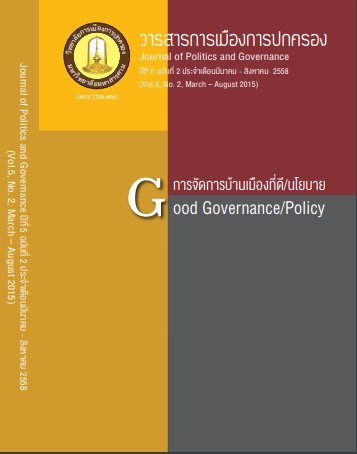Public Finance in the ASEAN: Trend and Patterns
Main Article Content
Abstract
The governments of ASEAN member countries play an important role in the development or continuous development of their respective economies and improvement or continuous improvement of the quality of life of its people. Each government can utilize the fiscal tools of taxation, the budget, and borrowing to influence private sector investment and performance, and to direct the government’s fiscal programs and accompanying expenditures towards the promotion of the general welfare of society as a whole. Amidst international suggestion on any government to adopt the broad policies of privatization, liberalization, contracting out, decentralization and minimum intervention in the economy, a government’s fiscal role has never been more important and remains critical as it continuously endeavors to raise the quality of life of its people.
Article Details

This work is licensed under a Creative Commons Attribution-NonCommercial-NoDerivatives 4.0 International License.
References
Abubakar, Mustafa M.Si. (2010). Minister of State-Owned Enterprises. 29 September. Ministry of State-Owned Enterprises – Indonesia Towards World Class Corporations. Republic of Indonesia. Link: http://www.euromoneyconferences.com/downloads/asia/2010/indonesia10/soe.pdf.
Asian Development Bank. (2014). Final Report on Compliance Review Panel Request No. 2012/2 on the Greater Mekong Subregion: Rehabilitation of the Railway Project in the Kingdom of Cambodia. ADB Loan 2288 and ADB Loan 2602/Grant 0187 [Supplementary]). 14 January.
Asian Development Bank. (2005). Progress Report on the State-Owned Enterprise Governance and Privatization Program (Loan 1866-INO) in Indonesia. September.
Aderonke Gbadamosi. (2013). Understanding the Developed/Developing Country Taxonomy. June 6, Link: http://a4id.org/blog/understanding-developeddeveloping-country-taxonomy
Agung Wicaksono. (2008). Indonesia State-Owned Enterprises: The Challenge of Reform. Southeast Asian Affairs. Institute of Southeast Asian Studies (ISEAS), pp. 146-167. Article Stable URL: http://www.jstor.org/stable/27913357.
Bowornwathana, Bidhya. (2011). History and Political Context of Public Administration in Thailand. Chapter 2, In Evan Berman (ed.), Public Administration in Southeast Asia: Thailand, Philippines, Malaysia, Hong Kong and Macau. (pp. 29-52).CRC Press Taylor & Francis Group.
BTI. (2014). Cambodia Country Report. Link: http://www.bti-project.org/reports/country-reports/aso/khm/index.nc#chap6.
Berman, Evan. (2011). Public Administration in Southeast Asia: An overview. Chapter 1, in Evan Berman (ed.), Public Administration in Southeast Asia: Thailand, Philippines, Malaysia, Hong Kong and Macau. CRC Press Taylor & Francis Group, pp. 1-25.
Cambodia. (2012). Investment Climate Statement, January, pp. 1-12. Link: http://photos.state.gov/libraries/cambodia/231771/PDFs/2012_investment_climate_statement.pdf.
Chin, James. (2011). History and Context of Public Administration in Malaysia. In Evan M. Berman (ed.), Public Administration in Southeast Asia: Thailand, Philippines, Malaysia, Hong Kong and Macau. CRC Press Taylor & Francis Group, pp. 141-154.
International Monetary Fund (IMF), World Economic Outlook 2013.
Kun Li & Lopez-Murphy, Pablo. (2010). Tax Revenue Downturns: Anatomy and Links to Imports. International Monetary Fund Working Paper/10/138
Lorenz, Andreas. (2013). Land Grab: Foreign Firms Drive Cambodians from Farms. Spiegel Online International. November 27, Link: http://www.spiegel.de/international/business/foreign-companies-are-taking-farmlands-away-from-cambodians-a-935801.html
Nielsen, Lynge. (2011). Classification of Countries based on their Level of Development: How it is Done and How it Could be Done. IMF Working paper WP/11/31, pages 1-45.
Raheja, Mukul. (2014). The dire need for reform of Indonesian SOEs. The Jakarta Post, Opinion. February 26. Link: http://www.thejakartapost.com/news/2014/02/26/the-dire-need-reform-indonesian-soes.html.
Revenue Statistics tax to GDP ratio changes in 2011, www.oecd.org. Link: http://www.oecd.org/ctp/tax-policy/revenue-statistics-ratio-change-previous-year.htm.
Stockholm International Pease Research Institute (SIPRI). (2013). Military Expenditure Database Link: http://www.bti-project.org/reports/country-reports/aso/khm/index.nc#chap6.
The World Bank, World Development Indicators 2013.
United Nations. (2012). Statistical Annex. World Economic Situation and Prospects, page. 135.Link: http://www.un.org/en/development/desa/policy/wesp/wesp_current/2012country_class.pdf
US Department of State, Bureau of Economic and Business Affairs. (2012). Investment Climate Statement –Cambodia. June. Link: http://www.state.gov/e/eb/rls/othr/ics/2012/191121.htm
Vietnam Briefing. (Jan 3, 2014). The Decline of State-Owned Enterprises in Vietnam. Posted on Link: http://www.vietnam-briefing.com/news/decline-state-owned-enterprises-vietnam.html/.
Warganegara, D. L., Hutagaol, 2 Y. R .I., Saputra, M. A., Anggraini, 4 Y. (2013). State-Owned Enterprises and Corporate Governance Strength: Evidence from Indonesia. International Journal of Management and Business Research, 3 (4) 325-335, Autumn
data.worldbank.org
www.adb.org
www.tradingeconomic.com.


